Welcome back to This Week in Apps, the weekly TechCrunch series that recaps the latest in mobile OS news, mobile applications and the overall app economy.
The app industry continues to grow, with a record 218 billion downloads and $143 billion in global consumer spend in 2020. Consumers last year also spent 3.5 trillion minutes using apps on Android devices alone. And in the U.S., app usage surged ahead of the time spent watching live TV. Currently, the average American watches 3.7 hours of live TV per day, but now spends four hours per day on their mobile devices.
Apps aren’t just a way to pass idle hours — they’re also a big business. In 2019, mobile-first companies had a combined $544 billion valuation, 6.5x higher than those without a mobile focus. In 2020, investors poured $73 billion in capital into mobile companies — a figure that’s up 27% year-over-year.
This Week in Apps offers a way to keep up with this fast-moving industry in one place with the latest from the world of apps, including news, updates, startup fundings, mergers and acquisitions, and suggestions about new apps and games to try, too.
Do you want This Week in Apps in your inbox every Saturday? Sign up here: techcrunch.com/newsletters
Top Stories
 Google lowers its Play Store commissions. In a significant move, Google announced it would lower commissions on subscription-based apps to 15% from day one, instead of 30% for the first year, which then drops to 15% in year two and beyond (like Apple offers). It also announced that apps participating in its new Play Media Experience Program could see their commissions adjusted to as low as 10%. This program includes apps where the content costs account for the majority of sales, including video streaming, music and e-books apps. Google also competes in some of these areas with its own services and is under increased threat of regulation globally, as well as engaged in lawsuits over app store fees, including one in the U.S. with Epic Games. The new fees will kick in on January 1, 2022 and follow Google’s previously announced reduction of commissions from 30% to 15% on the first $1 million of developer earnings. Google says 99% of developers will qualify for a service fee of 15% or less. Sensor Tower data indicates Google Play saw $38.8 billion in overall consumer spending in 2020, earning it $11.6 billion in in-app purchases.
Google lowers its Play Store commissions. In a significant move, Google announced it would lower commissions on subscription-based apps to 15% from day one, instead of 30% for the first year, which then drops to 15% in year two and beyond (like Apple offers). It also announced that apps participating in its new Play Media Experience Program could see their commissions adjusted to as low as 10%. This program includes apps where the content costs account for the majority of sales, including video streaming, music and e-books apps. Google also competes in some of these areas with its own services and is under increased threat of regulation globally, as well as engaged in lawsuits over app store fees, including one in the U.S. with Epic Games. The new fees will kick in on January 1, 2022 and follow Google’s previously announced reduction of commissions from 30% to 15% on the first $1 million of developer earnings. Google says 99% of developers will qualify for a service fee of 15% or less. Sensor Tower data indicates Google Play saw $38.8 billion in overall consumer spending in 2020, earning it $11.6 billion in in-app purchases.
 Apple introduced a new set of App Store Guidelines which include three key changes, including those to anti-steering rules. One of the changes is the result of a previously announced settlement agreement with a class of U.S. app developers. It clarifies that developers are allowed to communicate with their customers about other payment methods available outside their app. Related to this, another new guideline explains that apps may request customer information like name and email, but the request must be optional for the user and shouldn’t prevent them from using the app. The third guideline is unrelated to legal action, and simply details how developers can use a new App Store feature, called in-app events, which rolls out next week.
Apple introduced a new set of App Store Guidelines which include three key changes, including those to anti-steering rules. One of the changes is the result of a previously announced settlement agreement with a class of U.S. app developers. It clarifies that developers are allowed to communicate with their customers about other payment methods available outside their app. Related to this, another new guideline explains that apps may request customer information like name and email, but the request must be optional for the user and shouldn’t prevent them from using the app. The third guideline is unrelated to legal action, and simply details how developers can use a new App Store feature, called in-app events, which rolls out next week.
 Trump announced his plans to launch a new social networking app, which of course he’s calling Truth Social. The former president was banned from major social platforms following the January 6 attack on the Capitol, for using his account to incite violence. According to a press release this week, Trump Media and Technology Group will merge with a SPAC called Digital World Acquisition Group to launch Truth. But before you go thinking Trump has built his own Twitter, it turns out the new network is actually just a fork of the open-source Mastodon codebase. Mastodon is released under the AGPLv3 license, which requires the code and its modifications to be made public. Truth has not done so, even though screenshots and investigations clearly reference Mastodon. Instead, the Truth website falsely claims all its source code is proprietary. This means Truth is in violation of the Mastodon licensing agreement, and the organization is now seeking legal counsel. Ironically, Truth is starting off with a lie. Who would have guessed it!
Trump announced his plans to launch a new social networking app, which of course he’s calling Truth Social. The former president was banned from major social platforms following the January 6 attack on the Capitol, for using his account to incite violence. According to a press release this week, Trump Media and Technology Group will merge with a SPAC called Digital World Acquisition Group to launch Truth. But before you go thinking Trump has built his own Twitter, it turns out the new network is actually just a fork of the open-source Mastodon codebase. Mastodon is released under the AGPLv3 license, which requires the code and its modifications to be made public. Truth has not done so, even though screenshots and investigations clearly reference Mastodon. Instead, the Truth website falsely claims all its source code is proprietary. This means Truth is in violation of the Mastodon licensing agreement, and the organization is now seeking legal counsel. Ironically, Truth is starting off with a lie. Who would have guessed it!
 Android apps arrive on Windows 11. Microsoft this week began testing Android apps on Windows. The company brought around 50 Android apps to the Windows 11 Insider Program, allowing users to try apps including the Amazon Kindle app, The Washington Post app, Clash of Kings, Coin Master and Lego Duplo World, among others. The apps will run on both AMD and Intel devices with the apps running on the Windows Subsystem for Android (powered by Intel Bridge Technology). PCs will need to have virtualization enabled, run Windows 11 and you’ll need an Amazon account to access the Amazon Appstore. Now that the apps can run, next comes the real question: will anyone care to use them?
Android apps arrive on Windows 11. Microsoft this week began testing Android apps on Windows. The company brought around 50 Android apps to the Windows 11 Insider Program, allowing users to try apps including the Amazon Kindle app, The Washington Post app, Clash of Kings, Coin Master and Lego Duplo World, among others. The apps will run on both AMD and Intel devices with the apps running on the Windows Subsystem for Android (powered by Intel Bridge Technology). PCs will need to have virtualization enabled, run Windows 11 and you’ll need an Amazon account to access the Amazon Appstore. Now that the apps can run, next comes the real question: will anyone care to use them?
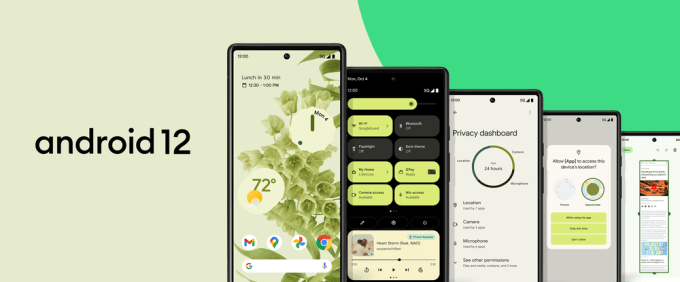
Image Credits: Google
 Google introduced new Pixel 6 smartphones and rolled out Android 12 to the public. Android 12 is a major update in terms of the look-and-feel of Android, as it introduces a themeable, personalized design language called Material You, which lets you quickly and easily change the entire look of your phone across the lock screen, settings, notifications, widgets, apps and more. It also adds better accessibility and privacy features, new widgets, improved enterprise features and other tools.
Google introduced new Pixel 6 smartphones and rolled out Android 12 to the public. Android 12 is a major update in terms of the look-and-feel of Android, as it introduces a themeable, personalized design language called Material You, which lets you quickly and easily change the entire look of your phone across the lock screen, settings, notifications, widgets, apps and more. It also adds better accessibility and privacy features, new widgets, improved enterprise features and other tools.
Weekly News
Platforms: Apple
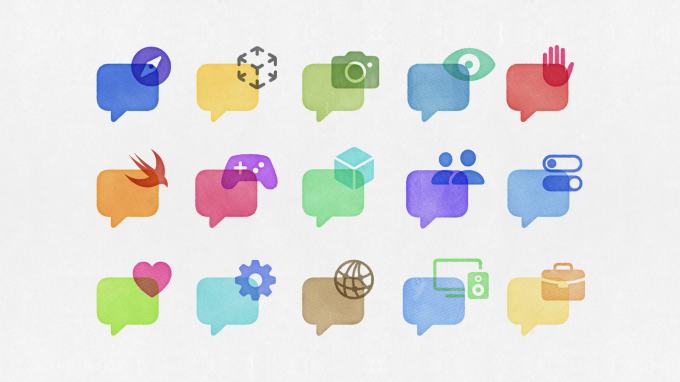
Image Credits: Apple
- Apple introduced Tech Talks 2021, a series of over 100 online sessions and 1,500 office hours designed to help developers building apps and games. The Tech Talks will run over the course of the next eight weeks and will be conducted across time zones. Office hours will focus on things like App Review, Evangelism, App Store Connect and Developer Technical Support, and will offer developers 30-minute conversations about their apps to help problem-solve and better understand guidelines and tools. The sessions are free of charge to members of the Apple Developer Program and the Apple Developer Enterprise Program.
- Alongside its new Macs, Apple launched a $4.99/mo version of its Apple Music service which only operates by way of Siri. Likely designed primarily for use with HomePod (or perhaps AirPods), subscribers will only see an Apple Music interface that shows suggestions based on their preferences and their recently played tunes.
- Apple will roll out software updates across all platforms next week. The company announced the news in a press release for AirPods (third gen.), noting iOS 15.1, iPadOS 15.1, watchOS 8.1, tvOS 15.1 and macOS Monterey were all on the way in the week ahead.
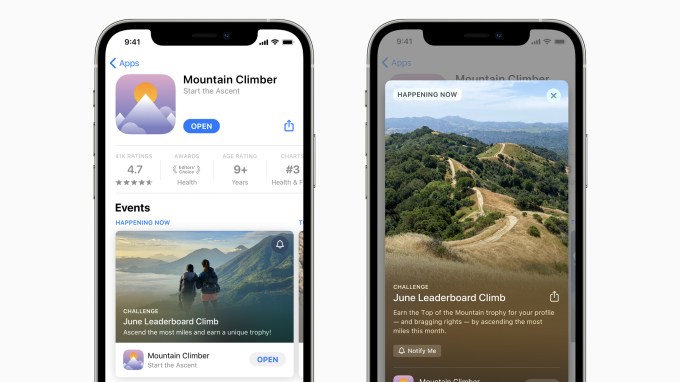
Image Credits: Apple
- Along with the release of iOS 15.1, Apple said developers will be able to make their in-app events discoverable directly on the App Store. Developers can create their events in App Store Connect and schedule when they want them to appear. The feature will give app makers a better way to showcase things like game competitions, movie premieres and livestreamed experiences. The events will begin to appear starting on October 27.
Platforms: Google
Image Credits: Google
- Google also announced Pixel Pass, an all-in-one subscription that combines a brand-new Pixel phone with access to Google’s premium services. The service is available at $45 per month for the Pixel 6 and $55 per month for the Pixel 6 Pro and includes YouTube Premium, YouTube Music Premium, 200 GB of cloud storage with Google One, Google Store discounts and a Google Play Pass subscription to free apps and games without ads or in-app purchases.
- Among the new features coming to Pixel 6 first is an updated Phone app that will show callers the expected wait times for toll-free numbers, and which will help guide callers through businesses’ phone trees by having Google Assistant listen to the options and display them as text.
- Pixel 6 will also include a new feature called Quick Tap that adds a camera-only version of Snapchat directly to the device’s lock screen. The feature will make it easier and faster to take photos to share on Snap and represents an interesting take on the typical app pre-load deal by making it seem more like a device feature, not bloatware.
- Google Play now allows app developers to fill out their “Data Safety” info for the section that will come to the Play Store in February. Once live, users will be able to view details about the data collected by the app and how developers will use that data alongside the app’s listing.
E-commerce
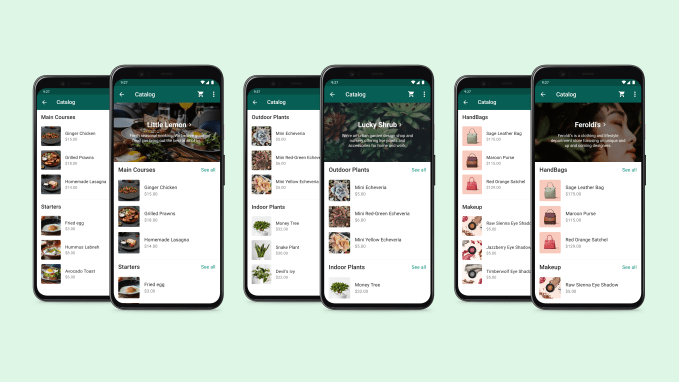
Image Credits: WhatsApp
- WhatsApp rolled out a new Collections feature to make it easier to shop through its app. Collections allow businesses to organize the items in their catalogs by category so customers won’t have to scroll through long lists of items to find what they’re looking for.
- Spotify partnered with Shopify to allow artists to sell their merchandise through their profiles in the Spotify app. The integration will allow artists to sync their product catalogs to Spotify and choose three items to feature on their profiles. Spotify has a similar integration with Merchbar.
- Walmart begins testing shopping via text. Walmart’s R&D group Store Nº8 begin testing a feature called Walmart Text to Shop with customers in select markets to better understand how conversational commerce could work for its customers.
Augmented Reality
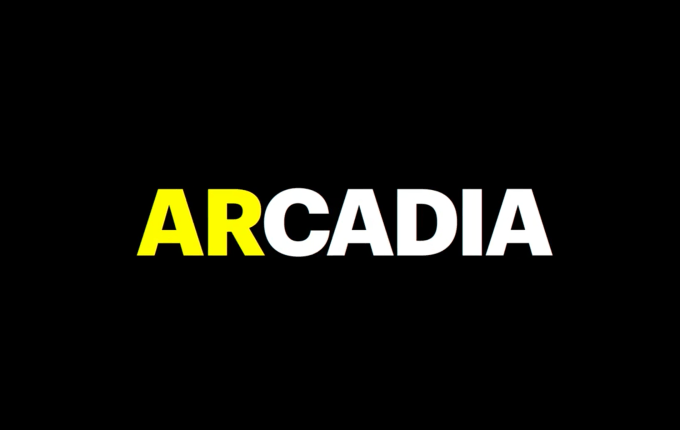
Image Credits: Snap
- Snap announced the launch of Arcadia, a global creative studio that will help brands deliver AR advertising and experiences that can be shared across web platforms and app-based AR environments beyond just Snapchat itself. The studio, which will function as a division of Snap, will partner with brands and creators, and is already working with Verizon, WWE, Shake Shack and P&G Beauty. As part of this launch, Snap took over a Shake Shack in NYC for a week to show of AR experiences.
Fintech
Facebook launched its digital wallet app Novi into a pilot program that enables users to start trading the Paxos Dollar (USDP), a stablecoin tied to USD created by Paxos. Coinbase will provide custody services for the program which will first be available in the U.S. and Guatemala to enable cross-border money transfers. However, Novi won’t initially take advantage of the Diem Association’s stablecoin Diem, as Facebook says it’s awaiting regulatory approval. The app is available on iOS and Android.
Social
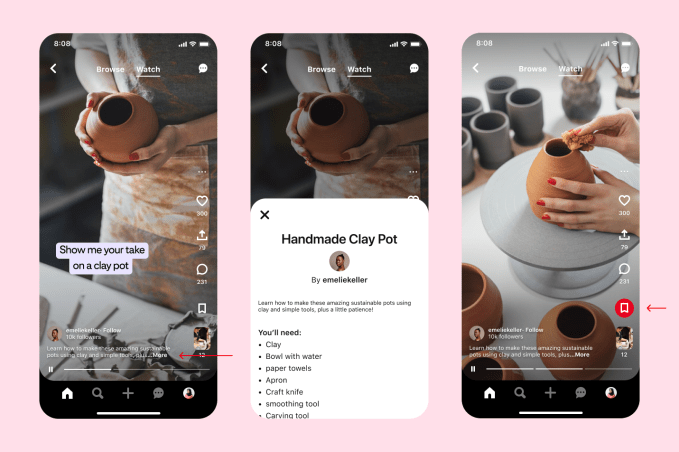
Image Credits: Pinterest
- Pinterest clones TikTok and announces $20 million in creator rewards. Pinterest has been trying to reposition its business as a home to creators, not just a shopping inspiration site. This week it expanded those efforts with new TikTok-inspired features, including a vertical video feed that features its video-powered “Idea Pins” and the ability to respond to videos with “Takes.” It also announced a plan to invest $20 million in “Creator Rewards,” a series of expanded creator tools, support for the Amazon Associates affiliate program, as well as the launch of its own original content.
- Snap shares drop 22% after the app missed on revenue expectations in its Q3 earnings. Snap brought in $1.07 billion in revenue versus the $1.10 billion forecast by Refinitiv. The company said its advertising business was hit harder than expected by Apple’s privacy changes. DAUs were up to 306 million from 293 million in the prior quarter.
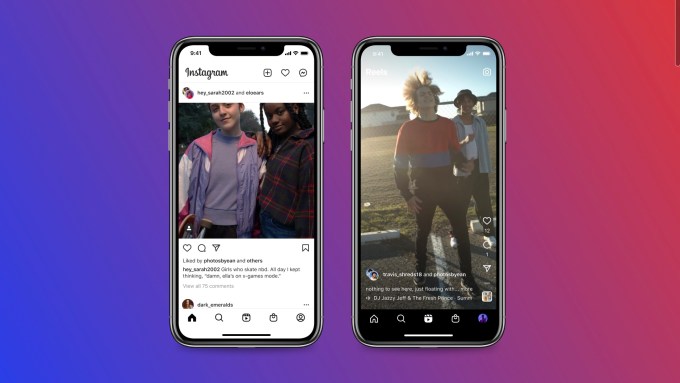
Image Credits: Instagram
- Instagram adds “Collabs,” new music features, support for posting from the desktop web and new fundraiser features, in a series of updates. Collabs allow people to co-author both Feed posts and Reels. To do so, users can invite another account to be a collaborator from the tagging screen on Instagram. If the other person accepts, both accounts will appear in the post or the Reels header and content will be shared to both sets of followers. It also added new effects called Superbeat and Dynamic Lyrics. The former intelligently applies special effects to music to the beat of the user’s song and the latter displays 3D lyrics.
- Facebook tests a new option for cross-posting Facebook Feed posts to Instagram. Users with the option will be able to cross-post to Instagram single photos, single videos or multi-photo albums up to 10 photos — the max that’s supported through Instagram’s carousels. Other formats, like GIFs, polls, photos albums with more than 10 photos, Feed reshares, text-only posts and any media that’s too tall for Instagram’s Feed are not eligible for cross-posting.
- Twitter rolls out the ability for anyone to host a Space on iOS and Android. Previously, the company had limited access to hosting Spaces to accounts with at least 600 followers. Twitter says it’s still rolling out the dedicated Spaces tab, which was recently extended to more people in English on iOS, but is not yet available on Android. It also added the ability to subscribe to people’s Revue newsletters from the Timeline.
- TikTok says its videos longer than 1 minute have received over 5 billion views globally, and videos span over 2 minutes, on average. The new format is most popular in Vietnam, Thailand and Japan, while TikTok users in the U.S., U.K. and Brazil engage with longer videos the most.
Messaging
- Facebook Messenger added new AR experiences for group video calls. Unlike traditional AR effects, the new “Group Effects” apply to everyone in the call at the same time. At launch, over 70 group effects are available, including a game where you compete to build the best burger the fastest. Facebook says the feature will be coming to Instagram soon.
- WhatsApp expanded its joinable calls feature to group chats. Joinable calls were first introduced in July and allow users to join an ongoing group call after it has begun.
Streaming & Entertainment
- YouTube Music’s free tier will go audio-only starting next month as part of a major update to the YouTube Music app. The music, however, will now stream in the background when the app is minimized or the phone screen is off, as part of the free service, but videos will become a paid feature.
- YouTube tops $3 billion in consumer spend on iOS as of October 17, 2021, according to App Annie data. YouTube ranked No. 3 among all non-gaming apps by global lifetime consumer spend as of October 2021, the firm said.
- Amazon Music added support for spatial audio to more devices, including iOS and Android devices with their existing headphones and select devices that support Alexa Cast. Spatial audio was first introduced in 2019, but had not yet been available through mobile on headphones. The feature is offered to Amazon Music Unlimited subscribers only.
- Spotify opened up access to a new tool for creators that will allow them to begin publishing their video podcasts to its service. The tool will be provided by the company’s podcast creation platform Anchor, and expands on the global launch of video podcasts last year, which encompassed only a select group of creators. Currently, the product involves a waitlist, but Spotify says users should expect to see an expanded selection of video soon.
Gaming
- Google’s Stadia game-streaming service is going white label. The company had earlier said it would offer its services to partners, and now AT&T Wireless customers will be able to stream “Batman: Arkham Knight” from their browser…but on their desktop, not phone (oddly). This is the first in-the-wild example of Stadia’s white-labeling, however. More are likely to come.
- App Annie updates its Game IQ market intelligence tool with enhancements including Feature Tagging, Genre Summary and Tag Trends.
Health & Fitness
- Digital therapeutics company Limbix released data from a trial on its new product, SparkRx, a self-guided therapy program for teens run entirely on a phone. The app is designed to help teens manage depression, by encouraging teens to take note of their feelings, and schedule activities that leave them feeling better.
Travel & Transportation
- Bolt Mobility launched in-app navigation for its shared e-scooters. The system is called MobilityOS and will be accessed via a smartphone that will be mounted to, and charged by, the scooter. The mounts will roll out to the next-gen scooters, the “Bolt Two.”
- Lyft says it received over 4,000 reports of sexual assault, including 360 reports of rape, on its app from 2017-2019. The findings were revealed as part of the company’s first-ever safety report, arriving two years after Uber’s.
Government & Policy
- The Yahoo Finance iOS app was removed from China’s App Store. Neither Apple nor Yahoo commented on the matter, but it’s possible the app was pulled because it was being used as a way to read news stories from media outlets that are typically blocked by the Chinese government.
- Apple also removed a popular Quran app in China after a request from local regulators. The app allowed users to read the Islamic religious text and other prayer-related information.
- TikTok and Snap will testify before Congress for the first time next week as part of lawmakers’ investigation into how Big Tech platforms are impacting kids’ safety. (Snap will likely discuss its plans for a new family center in its app, which will offer some sort of parental insights and controls over minor children’s usage.)
- Facebook was fined $70 million by U.K. regulators for deliberately withholding information related to the ongoing antitrust investigation of its Giphy acquisition.
Security & Privacy
- Tencent says it fixed a vulnerability that made some WeChat content available to Google and Bing, both of which are blocked in China. Ahead of the news, there was speculation that Beijing regulators had won a victory in their push to stop tech firms from building walled gardens which blocked rivals from accessing data in each others’ services.
- Google’s Play Protect service is split off into its own app with Android 12. The safety service scans for malware on your device, and could be now easier to update as a standalone application.
Funding and M&A
 A report by Bloomberg that Pinterest could be acquired by PayPal for $39 billion drove Pinterest stock up 19%. Investors liked the idea of turning the inspirational shopping platform into a payments pipeline, it seems.
A report by Bloomberg that Pinterest could be acquired by PayPal for $39 billion drove Pinterest stock up 19%. Investors liked the idea of turning the inspirational shopping platform into a payments pipeline, it seems.
 Twitter acquired London-based group chat app Sphere. The app was founded by Tomas Halgas and Nick D’Aloisio — who previously founded news summary app Summly, which he sold to Yahoo at the age of 17 for a reported $30 million. Deal terms were not disclosed, but Sphere’s team of 20 will join Twitter and the app will be shut down.
Twitter acquired London-based group chat app Sphere. The app was founded by Tomas Halgas and Nick D’Aloisio — who previously founded news summary app Summly, which he sold to Yahoo at the age of 17 for a reported $30 million. Deal terms were not disclosed, but Sphere’s team of 20 will join Twitter and the app will be shut down.
 Pear Sports acquired the popular workout app Aaptiv, which has 13 million downloads and has seen more than 36 million classes taken. The app will continue to operate and Pear says it will further invest in the product by integrating it with Pear Training Intelligence and bringing it to employers. Deal terms weren’t shared.
Pear Sports acquired the popular workout app Aaptiv, which has 13 million downloads and has seen more than 36 million classes taken. The app will continue to operate and Pear says it will further invest in the product by integrating it with Pear Training Intelligence and bringing it to employers. Deal terms weren’t shared.
 Customer engagement platform Batch raised $23 million in its first-ever round led by Expedition Growth Capital with Orange Ventures participating after years of bootstrapping. Batch comes from the same team behind AppGratis, and began as managed push notification platform for iOS, Android and the web. It then expanded to become a martech platform that works with existing data sources, including CRM, CDP and analytics products. The company now counts 300 enterprise clients as customers.
Customer engagement platform Batch raised $23 million in its first-ever round led by Expedition Growth Capital with Orange Ventures participating after years of bootstrapping. Batch comes from the same team behind AppGratis, and began as managed push notification platform for iOS, Android and the web. It then expanded to become a martech platform that works with existing data sources, including CRM, CDP and analytics products. The company now counts 300 enterprise clients as customers.
 Indian social media app Lokal raised $12 million in a Series A funding led by Tencent, according to a source. The hyperlocal app helps users connect, find jobs, keep up with local information and more.
Indian social media app Lokal raised $12 million in a Series A funding led by Tencent, according to a source. The hyperlocal app helps users connect, find jobs, keep up with local information and more.
 Venezuelan delivery super app Yummy raised $18 million in Series A funding led by Anthos Capital. The app combines food delivery and ridesharing, and now has over 200,000 registered users.
Venezuelan delivery super app Yummy raised $18 million in Series A funding led by Anthos Capital. The app combines food delivery and ridesharing, and now has over 200,000 registered users.
 Indian fintech CRED, which helps users improve their credit by paying their credit cards on time, raised $251 million in Series E funding. The round was led by existing investors Tiger Global and Falcon Edge. Marshall Wace, Steadfast DST Global, Insight Partners, Coatue, Sofina, RTP and Dragoneer Capital also participated. The round values the business at $4.01 billion.
Indian fintech CRED, which helps users improve their credit by paying their credit cards on time, raised $251 million in Series E funding. The round was led by existing investors Tiger Global and Falcon Edge. Marshall Wace, Steadfast DST Global, Insight Partners, Coatue, Sofina, RTP and Dragoneer Capital also participated. The round values the business at $4.01 billion.
 Neobank Zopa raised $300 million in what it calls a pre-IPO round led by SoftBank that values the business at $1 billion. The bank offers a savings account along with credit and loan products, and counts some 500,000 users in the U.K. The company’s current run rate is £85 million ($116 million), and expects to be profitable this year.
Neobank Zopa raised $300 million in what it calls a pre-IPO round led by SoftBank that values the business at $1 billion. The bank offers a savings account along with credit and loan products, and counts some 500,000 users in the U.K. The company’s current run rate is £85 million ($116 million), and expects to be profitable this year.
 Neobank N26 raised $900 million in Series E funding for its digital banking service that reaches 7 million clients in 25 countries. The round values the fintech startup at $9 billion.
Neobank N26 raised $900 million in Series E funding for its digital banking service that reaches 7 million clients in 25 countries. The round values the fintech startup at $9 billion.
 South Korean travel tech startup Yanolja acquired a 70% stake in a listed South Korean e-commerce company, Interpark, for about $250 million. Yanolja is hoping to compete with foreign travel tech platforms by building a “super app” that will include more lifestyle services along with hotel, car, tickets and other travel booking services.
South Korean travel tech startup Yanolja acquired a 70% stake in a listed South Korean e-commerce company, Interpark, for about $250 million. Yanolja is hoping to compete with foreign travel tech platforms by building a “super app” that will include more lifestyle services along with hotel, car, tickets and other travel booking services.
 Mobile wallet provider Citcon raised $30 million in Series C funding led by Norwest Venture Partners and Cota Capital. The company allows merchants to accept payments online, in-store or inside apps — the latter of which also includes chat integration and support for WeChat Pay, WhatsApp and others.
Mobile wallet provider Citcon raised $30 million in Series C funding led by Norwest Venture Partners and Cota Capital. The company allows merchants to accept payments online, in-store or inside apps — the latter of which also includes chat integration and support for WeChat Pay, WhatsApp and others.
 Mobile data intelligence startup Embrace raised $45 million in Series B funding led by NEA. The company’s Data Intelligence product helps organizations make their mobile data accessible and actionable by their business intelligence and data science teams so that other departments can use the data when making decisions about new products and marketing campaigns.
Mobile data intelligence startup Embrace raised $45 million in Series B funding led by NEA. The company’s Data Intelligence product helps organizations make their mobile data accessible and actionable by their business intelligence and data science teams so that other departments can use the data when making decisions about new products and marketing campaigns.
 Kakao Pay, South Korea’s largest payments app, raised 1.53 trillion won ($1.3 billion) in its IPO after pricing shares at the top of a marketed range. The company sold its shares at 90,000 won apiece, after originally marketing 17 million shares for 60,000 to 90,000 won each.
Kakao Pay, South Korea’s largest payments app, raised 1.53 trillion won ($1.3 billion) in its IPO after pricing shares at the top of a marketed range. The company sold its shares at 90,000 won apiece, after originally marketing 17 million shares for 60,000 to 90,000 won each.
 Mobile games company Scopely announced it’s acquiring GSN Games, a division of Game Show Network, LLC, a wholly owned subsidiary of Sony Pictures Entertainment, for approximately $1 billion. The deal is being paid half in cash and half in preferred equity. GSN Games operates a portfolio of free-to-play mobile and online games, including Solitaire TriPeaks, Bingo Bash and others. It has 400 employees worldwide.
Mobile games company Scopely announced it’s acquiring GSN Games, a division of Game Show Network, LLC, a wholly owned subsidiary of Sony Pictures Entertainment, for approximately $1 billion. The deal is being paid half in cash and half in preferred equity. GSN Games operates a portfolio of free-to-play mobile and online games, including Solitaire TriPeaks, Bingo Bash and others. It has 400 employees worldwide.
 Game development studio Kazoo Games, which focuses on casual and midcore mobile games, closed on $12 million in Series A funding led by Garena. The funds will be used to advance development, hire new talent and prepare for the release of future titles for iOS and Google Play.
Game development studio Kazoo Games, which focuses on casual and midcore mobile games, closed on $12 million in Series A funding led by Garena. The funds will be used to advance development, hire new talent and prepare for the release of future titles for iOS and Google Play.
Downloads
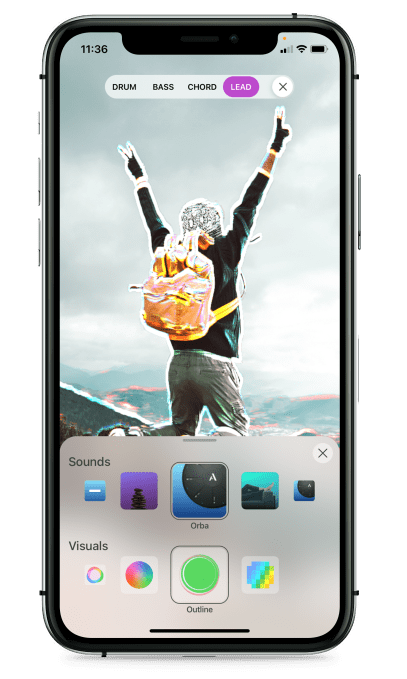
Image Credits: Artiphon
Artiphon debuted an app called Orbacam that allows you to create “Musical Selfies.” The app is meant to serve as a companion to the Orba, a music sequencer device aimed at amateur music makers. With the new app, users can sing or beatbox along with the music they’re creating, import videos and photos from their camera roll and add visual effects to their videos, which can then be shared across social media platforms, like TikTok. The iOS app itself is free to use but the Orba is $100. (Read the full review on TechCrunch)

